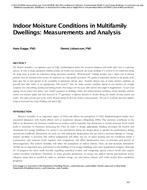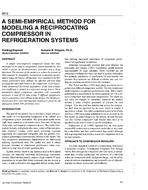The electrical load curves and outlet water temperatures of individual electrical water heaters using standard and modified heaters were determined. Modifications were made by changing the wattage of the lower element and/or installing a time clock on the bottom element to regulate when it could be energized. The units were located in a computerized laboratory facility where a fixed water withdrawal patttern was used to simulate typical water usage. A field test of a time clock on the bottcm element was also run on a group of houses representative of electric substation scale loading.
The laboratory results indicated that for the standard 52 gallon (197 L) water heater, the bottom element did all of the heating and it would come on whenever a small amount of water was withdrawn from the tank. The smaller lower element sizes increased the amount of heat input via the top element and tended to smooth the electrical demand curve. All of the smaller element wattages and time clock control test cases reduced the energy usage; however, a large component of this reduction was due to lower outlet water temperatures.
The results from the field test indicated that the time clocks reduced the usage by 12.2% ±5.8% and reduced the peak demand by 24.8% ±9.8% but did not decrease the variability during the non-space-conditioning season.
Units: Dual
Citation: Symposium, ASHRAE Transactions, 1988, vol. 94, pt. 1, Dallas, TX
Product Details
- Published:
- 1988
- Number of Pages:
- 13
- File Size:
- 1 file , 1.3 MB
- Product Code(s):
- D-DA-88-10-3


